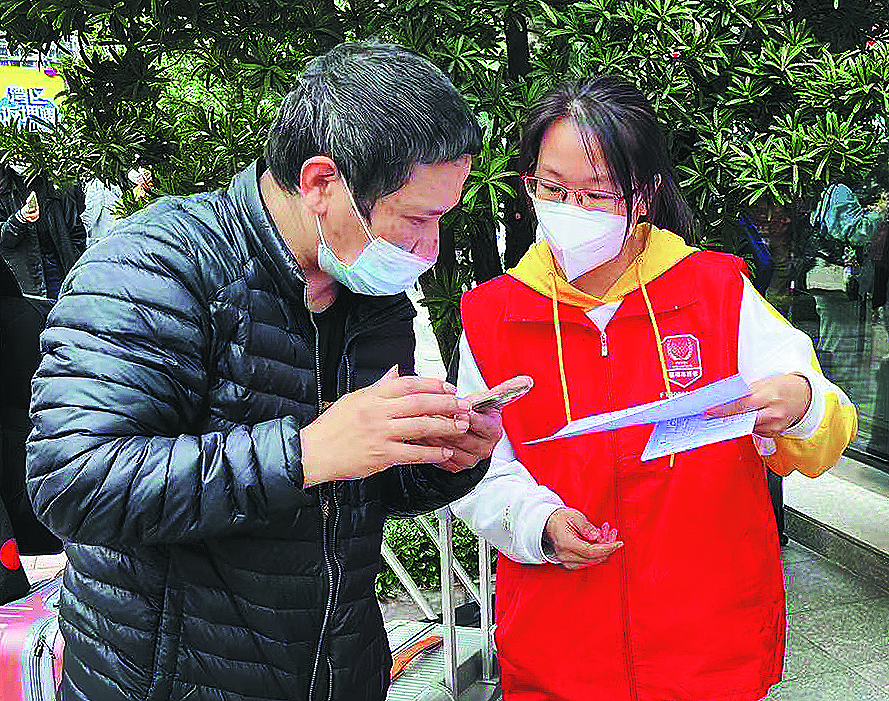Border volunteers win travelers' praise


Gu Junsong always refuses the hongbao, or red envelopes, containing small amounts of money, given by Hong Kong compatriots after he has helped them at the Futian Exit-Entry Port in Futian district of Shenzhen, Guangdong province.
"Although hongbao is just a small gift during the Chinese New Year, we are volunteers and should set a good image," said Gu, who is a captain of a volunteer team at Futian Exit-Entry Port bordering Hong Kong.
"I felt pride and happiness when the Hong Kong compatriots said 'thank you' after I offered them a helping hand," he said.
Gu has worked as a volunteer for 17 years.
According to Yi Min, secretary-general of Futian District Volunteer Association, every day since Jan 8 around 130 to 140 volunteers have worked on the front line of Futian Exit-Entry Port.
Most of the volunteers are university students and local residents, and more than half can speak Mandarin, Cantonese, Hakka and English, she said.
More than half are under 45 years old and have worked in other exitentry ports, major railway stations and airports and transportation hubs on the mainland, Yi said.
Yi said her association is still recruiting volunteers to work on the front line of exit-entry ports in the city as the number of passengers and tourists has soared after the country optimized its COVID-19 measures.
Exit-entry ports in Shenzhen have become the busiest land ports on the mainland.
"The volunteers will be sent to work and serve the passengers at Shenzhen's exit-entry ports after receiving special pre-job training," she added.
Gu said volunteers are happy to learn about the full border reopening between the mainland and Hong Kong starting on Monday. "It brings a new sense of happiness and honor to Hong Kong compatriots as well as residents in Shenzhen."
Gu usually comes to work at 6 am, wearing a red vest.
"Many volunteers who live far away from the port have to get up very early as they are required to come to work on time," said Gu.
The first batch of passengers from Hong Kong usually arrive in the port at about 6:30 am and begin customs procedures. Volunteers are required to welcome the passengers before they arrive, he said.
In addition to guiding passengers through customs, Gu sometimes helps them with their luggage and filling in forms.
Wheelchairs and medicine have been prepared for pregnant women, the elderly, those with mobility issues and those in need, he said.
As a captain, Gu said he usually gets off work at about 9:30 pm.
Although Gu is tired after work, he still feels very happy.
"A bit of fragrance always clings to the hand that gives others roses," he said, adding that the work of volunteers has been recognized and praised by passengers.
Two passengers from the US praised the volunteers after being told in English how to take public transportation and were sent to a nearby metro station.
Meanwhile, the volunteers provided them with an English version of the tourist map and recommended famous scenic spots in Shenzhen.
The daughter of an 82-year-old Hong Kong resident also phoned the volunteers to express her gratitude after they helped the elderly man with his two large pieces of luggage and took him to the volunteer station for a rest.
Volunteers also chatted with him and provided lunch while waiting for his daughter to pick him up. The elderly man had not returned to the mainland for three years.
Zhu Ruiqi in Guangzhou contributed to this story.
- Zhuhai man given death for car attack
- China revises upper age limit for driver's license
- Infant immunization schedule changes from Jan 1
- Peak season for respiratory illnesses continues
- Former deputy Party chief of Shanxi given life sentence for bribery
- One-year-old, Beijing Library serves book lovers with passion





































